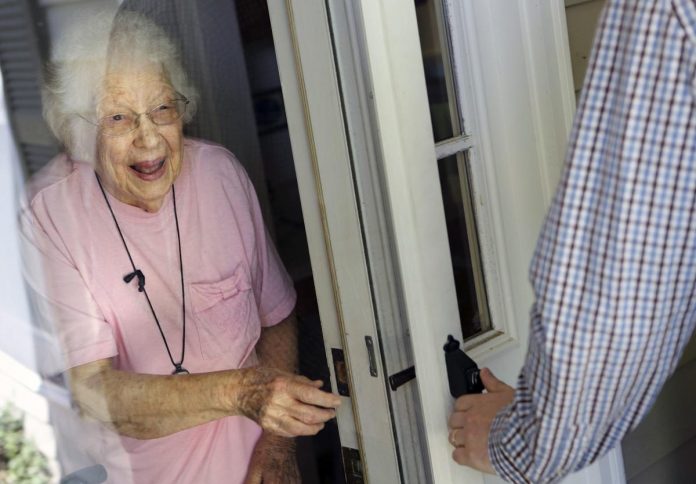If there’s one thing Erin Lukoss, CEO of the Bucks County Opportunity Council, wants people to take away from the COVID-19 pandemic, it’s that many are one step away from falling into poverty.
“It exists, and it’s not necessarily what you have in mind of what poverty is supposed to look like. It could be the people next door to you that just don’t have enough to make ends meet. They have enough to keep a roof over their heads, and maybe that’s the extent of it. But it doesn’t mean that they’re doing OK,” she said.
Despite Bucks County being considered the third-wealthiest county in Pennsylvania, according to Lukoss, when COVID-19 hit earlier this year, an unprecedented number of residents struggled to afford food, housing and other basic necessities.
During a recent Bucks County Commissioners virtual news conference, Lukoss made a guest appearance to detail how the BCOC has been coming to the aid of locals throughout these trying times.
One of the first initiatives the BCOC took was to partner with Family Service Association of Bucks County, the Housing Department and landlords to move families out of the Levittown-based Emergency Homeless Shelter and into temporary, followed by permanent, housing. This was to keep them safe and socially distant from others.
In total, since the start of the outbreak, 39 families were moved into permanent housing. Additionally, 147 families received rental assistance to prevent eviction and maintain housing.
“Even though there wasn’t a threat of eviction per se, because there was a stay on evictions, families still needed to be able to pay rent,” said Lukoss. “When the moratorium was lifted on July 10, we didn’t want to see people come to the BCOC three or four months behind.”
As for Fresh Connect, a mobile farmers market that the BCOC operates in Bristol, Ottsville and Warminster, in conjunction with St. Mary Medical Center, Rolling Harvest Food Rescue, United Way of Bucks County and Philabundance, its offerings were expanded.
“We shifted that nice little produce program that we do every week that gives about 20 pounds of produce to giving shelf-stable food, dairy and produce to make sure that families had what they need,” Lukoss said. “At the beginning of this, we were serving about 400 families per week. And as of last week, we were over 1,200 families every week. We thought that things were leveling out, but we’re seeing that people are still in need.”
Lukoss, who has been a part of Fresh Connect distributions for the last three and a half months, said she often sees new individuals and families, many of whom never expected to require such assistance. She reflected on a Realtor, who was unable to show and sell houses. With limited income, and with the cost of groceries steadily rising, the Realtor had no choice but to seek help from the BCOC.
“Sometimes, I think people have that misconception that people choose their plate and they choose to be in poverty, and that’s simply not the case,” Lukoss said. “Sometimes, it’s that they just don’t know where to start. There are all these resources out there, but it’s overwhelming for how to access them or how to get started on their future.”
Commissioner Bob Harvie shared her sentiment, stating how the pandemic exposed many “economic faults” in the system.
“The pandemic hit, and all of the sudden we started seeing a lot of people all across the country who missed that one paycheck and they were in lines for food for their families. They were in danger of losing their homes, losing their apartments, finding themselves without the ability to get healthcare, to get the medications they might need for themselves or their families,” Harvie said. “We really have to question how strong the pillars of our economy are if one paycheck puts that many people in serious financial jeopardy. There has to be some changes.”
In addition to running Fresh Connect, the BCOC recently launched a touch-free, home delivery service to assist residents who are unable to safely leave their homes due to COVID-19. With the help of dedicated volunteers, emergency food boxes are delivered each week to seniors and/or those with disabilities.
As businesses begin to reopen, Lukoss said many will continue to feel the negative impacts of COVID-19.
“People are challenged with either getting back to work and making sure that they have the resources they need to return and/or starting a new career, retraining in something different if their job is no longer sustainable,” she said. “I think it’s important to help people find career paths that can help them sustain their family so that they don’t need to rely on the government subsidies.”
Residents can take advantage of virtual education and employment services through the BCOC, which offers the one-on-one Economic Self-Sufficiency coaching program.
“We can really help put the supports in place so that someone can retrain and can get back on their feet, or can have the supports that they need to go to work – transportation assistance, child care, all those kinds of things,” Lukoss said.
Visit bcoc.org for more information.
Samantha Bambino can be reached at [email protected]


